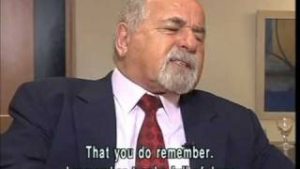Michael Stolowitzky
I was born into one of Poland’s wealthiest families. My father and his father before him were industrialists and had made millions of dollars supplying steel for the railroads to Russia.
We lived in a stately mansion in Warsaw, had countless servants, dined with the Polish elite and sailed the Adriatic every spring. But what I really remember is Gertruda Bablinska — my nanny. She was tall and blond with blue eyes. From the moment she came into my life she was always by my side. My mother would come in and check on me every day but it was Gertruda who really raised me.
Right before WWII broke out, my father, whose business was in jeopardy because the Nazis were seizing his factories in Berlin, received a big contract from the French government. He went to Paris to sign papers.
It was there he got news that Germany had invaded Poland. For the first time ever, his money did him no good. All communication lines were down and the borders were closed.
We never heard from him again. I only later found out he died in Auschwitz.
Back in Warsaw, it was no longer safe for us so Gertruda, my mother, our driver Emil and I fled to Vilna, a Lithuanian city under Soviet rule, which was protected by a non-aggression pact with Germany. Still, our driver turned on us once we got there — literally pointed a gun at us, took our money and kicked us out of the car. We had nothing.
Gertruda found us a one-room apartment and we lived like refugees. Because Gertruda spoke Polish and German she was able to find work as a translator in exchange for food for us — bread, eggs, chickens.
It was very hard for my mother. She missed my father, missed our old life and fell into a depression. In 1941 when I was three, the Germans invaded Vilna and my mother had a stroke. On her deathbed she asked Gertruda to save me and to get me to Palestine, where she had distant relatives. She gave Gertruda her wedding ring. Gertruda put the ring on and from that day forward raised me as her son.
Every day Gertruda told me I was different from the other kids. She reminded me that I was Jewish and I couldn’t let anyone know. Her biggest fear was the kids I was playing with — the greatest prize anyone could get in those days was to find a Jew. Sometimes I overdid it, talking about how I hated Jews and playing a shooting game with sticks called Let’s Kill The Jews.
Every day we passed posters that said anybody who is caught hiding a Jew will be executed without a trial. Every night the Germans would barge into our homes, yelling, “Open up! It’s the police!”
Suddenly our apartment would be full of soldiers with machine guns opening every drawer and looking in our closets asking if we were hiding any Jews. They’d storm into my room with flashlights. Gertruda would say, “This is my child!” in German.
One afternoon in 1944 we were walking in Vilna as dusk fell. It was cold but there wasn’t any snow. All of a sudden four soldiers appeared. Two of them pointed their guns at me, shouted “Stop!” and told me to take off my pants. Gertruda said to them in German, “What are you doing? My son is not Jewish!” but they didn’t listen. They grabbed my belt and tried to pull down my pants but I was holding my pants up with what little strength I had. I was only seven.
And then I heard another voice, “Leave him alone, he’s not Jewish.” It was an SS officer. The soldiers saw him and saluted and then disappeared. Later we learned that the officer, Karl Rink, had been married to a Jewish woman (who’d been killed by the SS) and had a daughter in Palestine. He saved other Jews as well.
Gertruda tried to protect me from the horrible scenes of people being killed and beaten all around us — if we were walking she’d suddenly cover my eyes and turn me towards her — but the noises, my God. The whole night it was gunshots and people yelling and screaming.
Towards the end of the war, we escaped to an abandoned bunker in the forest. When the Russian army liberated us, they took us back to Vilna in trucks — and the forest floor was covered with bodies. It was a pavement of death.
In 1947, Gertruda and I sailed on the Exodus to Israel, where I lived for thirty years. Eventually I moved to New York City, married and had a son — but almost every month I went back to Israel to see Gertruda who lived among the Jews as a “righteous gentile.”
In 1995, I was with her when she died. In the last minutes when she was gasping for air, I said to her, “Don’t worry, I will meet you up there. We will meet again.” I saw her blue eyes smiling. I know she understood me. And then she passed away. She was 93.
Gertruda saved my life. She is my life. I’m not afraid of dying because when that happens I will meet her and we’ll continue our journey. I will never be able to repay her for what she did but my small donation is that as long as I’m alive, I can tell her story.
Stolowitzky’s story is retold in “Gertruda’s Oath: A Child, A Promise, and a Heroic Escape During World War II” (Doubleday) by Ram Oren, out now. Story is as told to Alison Rosen.
From: NYPost


